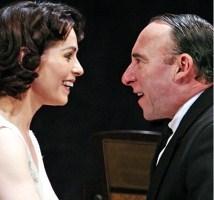Broken Glass
Written in 1994 when Arthur Miller was in his late 70s, 'Broken Glass' is set in Brooklyn, New York, in 1938. It revolves around a married couple, the Gellburgs, who find themselves in the midst of a crisis as Sylvia Gellburg has been inexplicably struck down by paralysis. Married for more than 20 years, the Gellburgs have problems which need to be examined.
Phillip Gellburg is the only Jew to work for a bank called The Brooklyn Guarantee and Trust, dealing with mortgages and the unpleasant task of foreclosure. He seems uncomfortable with being Jewish. He wears black clothing and tells us he has been doing so since high school in order to appear older and, perhaps, to give a more serious impression of his business acumen. He adores Sylvia and, later in the play, tells her he will die without her. But Phillip and Sylvia have not had sexual relations for more than 20 years, and the fault seems to lie with Phillip. Sylvia is a beautiful woman who follows the terrible events in Nazi Germany obsessively to the extent that it is quite literally terrifying her. And she has some justification, since we are left in no doubt that anti-Semitism is also in evidence in 1930s America.
Mike Britton's setting has more in common with a sanatorium than a family home where much of the action takes place. But that is appropriate in many respects since this is a psychological drama and the intention here is obviously to focus on the dialogue and action. The paint on the walls is peeling as if being undermined by some unseen force, reflecting the creeping separation that is tearing Sylvia and Phillip apart, and describing their decaying relationship.
The actors do not seem entirely comfortable with their Brooklyn accents, but that does not stop them producing memorable performances. Antony Sher presents a powerfully convincing Phillip who ably demonstrates his intense love for Sylvia and the frustration which eventually forces him to acknowledge the deceit which has underpinned his relationship with Sylvia. Though he squirms and writhes, almost in Uriah Heep fashion, when talking with his boss, he also shows he has the guts and will to change. Tara Fitzgerald presents us with a beautiful and passionate Sylvia who longs for romantic love and affection, and is consumed by regret. And Stanley Townsend is also in fine form as Dr Hyman, the doctor who is treating Sylvia and allows his amorous inclinations to invade the doctor-patient relationship.
Interspersed between the scenes, we are treated to some wonderfully atmospheric cello playing by Laura Moody. Sometimes grating unnervingly, and sometimes hauntingly melancholic, it sets the mood and tone for the play perfectly.
The title is not only connected with the horrific events of Kristallnacht (The Night of Broken Glass) in Germany in November 1938, but is indicative of the fact that the situation between Phillip and Sylvia cannot be resolved. Once broken, glass is the kind of substance which cannot be mended and that is precisely the position with the Gellburgs. The inevitability of the outcome is evident right from the start of the play, and is a feature of other work by Miller. It suggests a fatalism that may have some grounding in reality, but advances a rather depressing view of the human condition, leaving one with little sense of hope. Nonetheless, this is a riveting and moving drama.
"Broken Glass is a rich and deeply-felt drama "
Charles Spencer for The Daily Telegraph
"taut and intelligent."
Henry Hitchings for the London Evening Standard
External links to full reviews from popular press
Daily Telegraph -
Originally published on
